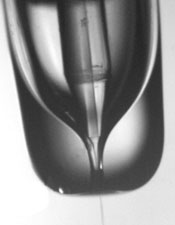


A particle gun that fires liquid droplets less than a millionth of a meter in diameter, faster than hundreds of thousands of times a second, is poised to revolutionize biological imaging. Tested at Berkeley Lab's Advanced Light Source and soon to be installed at SLAC's Linac Coherent Light Source, the sample jet injects a beam of droplets across a tightly focused x-ray beam in single file, each droplet so small it contains only a single protein or virus. The research was lead by John Spence, a physicist at Arizona State University. More>

 The recent declaration of an H1N1 pandemic and warnings about its potential effects in the fall have accelerated the Lab's effort to develop a Business Continuity Plan to ensure the research mission of the Lab continues in the event of a partial shutdown. Two new websites have been developed to address this issue. The Business Continuity Planning site contains important information about identifying essential functions and resource requirements and developing recovery plans to ensure operational continuity. The Pandemic Flu Information site contains essential facts about H1N1 as well as guidelines for employees should the pandemic affect them, their jobs, or Lab operations.
The recent declaration of an H1N1 pandemic and warnings about its potential effects in the fall have accelerated the Lab's effort to develop a Business Continuity Plan to ensure the research mission of the Lab continues in the event of a partial shutdown. Two new websites have been developed to address this issue. The Business Continuity Planning site contains important information about identifying essential functions and resource requirements and developing recovery plans to ensure operational continuity. The Pandemic Flu Information site contains essential facts about H1N1 as well as guidelines for employees should the pandemic affect them, their jobs, or Lab operations.
 [Economist] San Francisco conjures up images of hippies and of free love, the psychedelic 60s and leftist politics. But as someone who writes about science, I don't see a region full of people looking to escape reality; I see scientists and engineers at universities, companies, and national labs probing and investigating that reality on a daily basis. Plutonium was first discovered in a Berkeley lab (as were the aptly-named berkelium and californium). The Bay Area [specifically Berkeley Lab] is the birthplace of "big science" and of the atom smashers that have told us so much about the fundamental building blocks of matter. More>
[Economist] San Francisco conjures up images of hippies and of free love, the psychedelic 60s and leftist politics. But as someone who writes about science, I don't see a region full of people looking to escape reality; I see scientists and engineers at universities, companies, and national labs probing and investigating that reality on a daily basis. Plutonium was first discovered in a Berkeley lab (as were the aptly-named berkelium and californium). The Bay Area [specifically Berkeley Lab] is the birthplace of "big science" and of the atom smashers that have told us so much about the fundamental building blocks of matter. More>
The fueling station at Building 76 will be down due to repairs on Friday morning, 8 a.m. to 1 p.m., and next Monday through Thursday (Aug. 3-6). Staff are encouraged to fill up their vehicles before these shutdowns. If required to fill up off-site, contact the Work Request Center (x6274) for your vehicle's credit card.
[San Francisco Business Times] The National Institutes of Health's proposed $31 billion fiscal 2010 budget is headed to the Senate after winning House approval last Friday. The NIH is a key funder of basic scientific research at many Bay Area institutions. The House bill offers an increase of $500 million over President Obama's request and more than $940 million more than 2009 funding. Last year, Berkeley Lab received $39 million in funding. More>
Today at Berkeley Lab is produced by Public Affairs' Communications Department